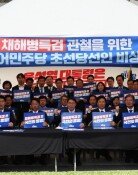No More Additional Income Tax Credits for One-person and Two-person Households
No More Additional Income Tax Credits for One-person and Two-person Households
Posted January. 31, 2006 03:01,
Households with one or two family members will face higher tax from next year as they will no longer enjoy additional earned income tax benefits.
As of 2004, about 2.84 million households with one or two members paid earned income taxes. One-person households will see their annual tax go up by 80,000 to 350,000 won, while two-person households will see 40,000 to 175,000 won increase according to the earning level.
In addition, higher tax rates will be applied to dividend earnings of institutional investors including financial institutions, mutual funds, and pension funds.
It has been confirmed yesterday that the government agreed on reducing the scope of tax exemption through consultations with related ministries including the Office of the Prime Minister, Ministry of Finance and Economy, Ministry of Planning and Budget, and Ministry of Government Administration and Home Affairs. This is a measure to raise 10.5 trillion won, additional resources necessary to establish a social safety network against the low fertility rate and aging population.
According to a government official, although the governments earlier decision to spend 20 trillion won between 2006 and 2010 on measures to tackle low fertility rate and aging population has already been reflected upon the budget plan for this year and medium term, it was decided to expand tax revenue and to reduce tax expenditure to raise additional 10.5 trillion won needed.
The Ministry of Finance and Economy is going to raise additional 500 billion won each year by eliminating additional tax benefits on one-person and two-person households. Those households will be affected by this measure from the end-of-year tax adjustment for this year, which will be done early next year.
Currently, one-person households are subject to additional income tax credit of one million won and two-person households additional 500,000 won, but this will no longer be the case.
Dividend incomes have been exempt from tax up to 90 percent as part of a measure to facilitate equity investment by institutional investors, but that percentage will be cut by a large extent from next year. The government expects to raise additional 200 billion won yearly with this new set of tax measures.
Furthermore, extraordinary investment tax credit, which cuts taxes for companies making facility investments, will be slashed from 10 percent to seven percent. This will lead to additional tax revenue of 500 billion won every year.
The Ministry of Planning and Budget decided to pursue measures to use 200 billion won, saved each year by cutting the increase in spending for improvement of labor conditions for government workers from three percent to two percent, on low fertility rate and aging population measures from 2007 and 2010.
Such are the plans to raise additional 1.4 trillion won yearly from four tax areas to make a total of 5.6 trillion won over the four years. Out of the necessary 10.5 trillion won, the remaining 4.9 trillion won will be filled in by restructuring tax spending.
It has been known that the recent remark by the Finance Minister Han Duck-soo that measures are already in place to raise money for low fertility rate and aging population policies implied concerned ministries agreement on this measure to increase tax revenues.
Do-Young Kim nirvana1@donga.com legman@donga.com
Headline News
- Korean president faces debate limitations unlike U.S. counterpart
- KEPCO's first quarter profits failed to meet market expectations
- Teenagers are left out of discussions about national pension
- 2 consultative bodies submit minutes regarding increasing number of medical students
- Woo Sang-hyuk's rivalry and friendship transcend borders







